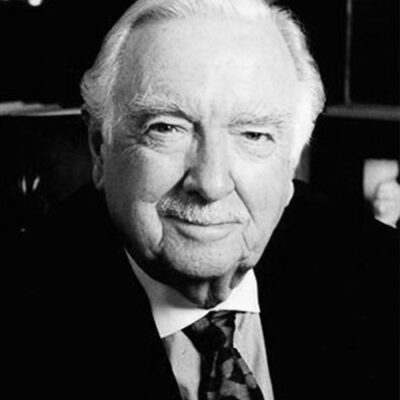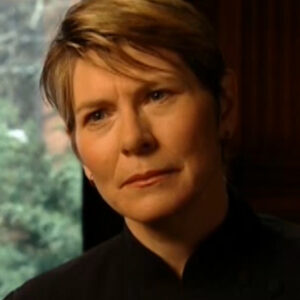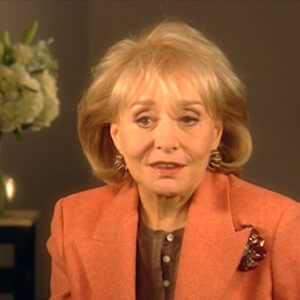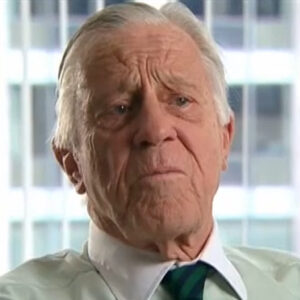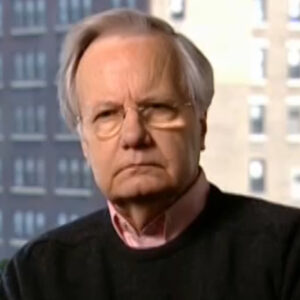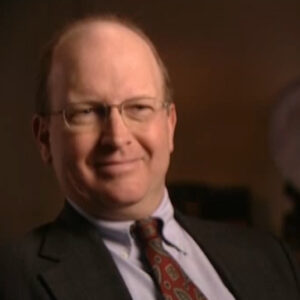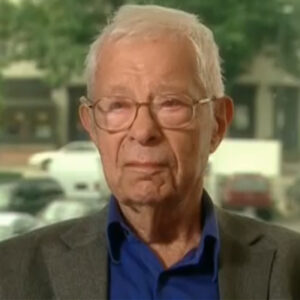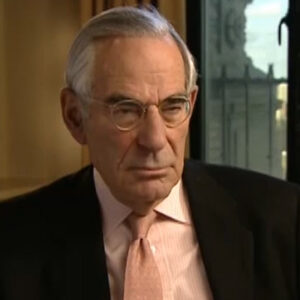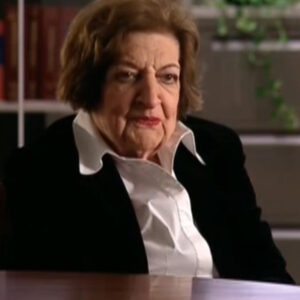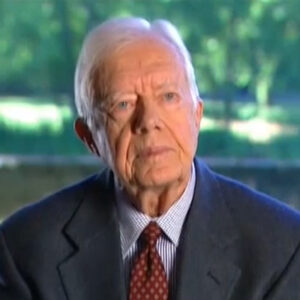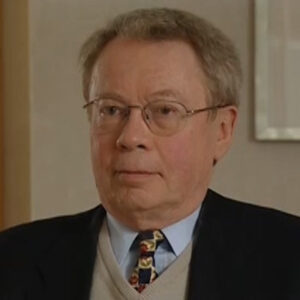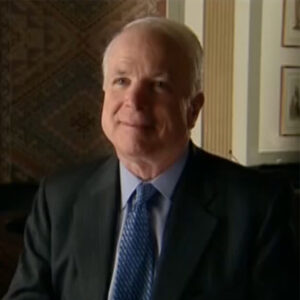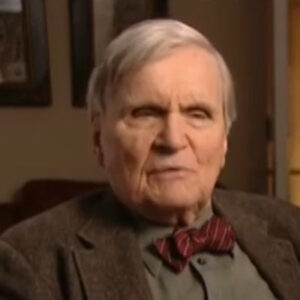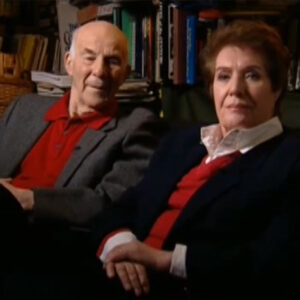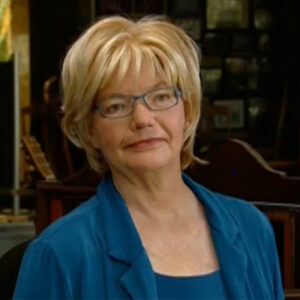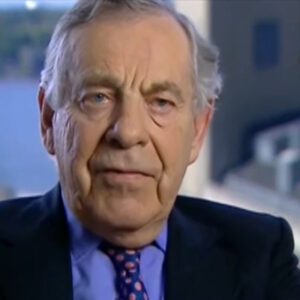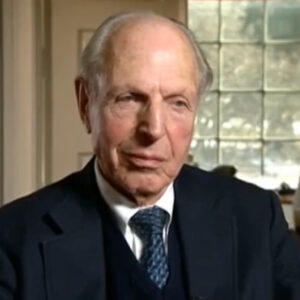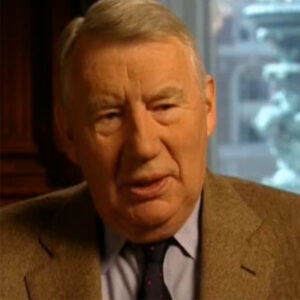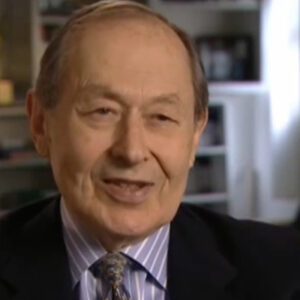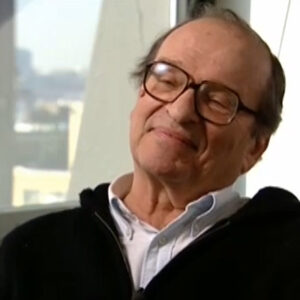Speaker If you would start with the first time you met Walter Cronkite, what were your first impressions? We wrote yes. Oh, fantastic. Very.
Speaker I think the first time that I met Nelson was probably P.J. Clarke’s on a Sunday night back in the 60s was a great scene. What’s my line? Team came in and were hailed as lions of the media. And. And there was always a gathering of people in the media there. PJ thought Saturday night. Sunday night. P.J. Clarke’s Sunday night after what’s in my line. The Media Center of New York for that period in the 60s.
Speaker And what were your first impressions when you met Walter?
Speaker When I’d seen him on television and of course, once one comes across as the things you think of him to this day, which are by which I mean that the sort of. Humility of the man which he never lost. I mean, however much he was the most trusted man in America. And however much Lyndon Johnson said the virus that lost Walter Cronkite. I’ve lost Middle America. He never lost that humility. And I think that came through almost straight away, I guess, at that time. He launched the CBS Evening News and so on. So he had every reason to be proud of what he did. And I’m sure he was privately proud of what he did. But he had this extraordinary humility. He never lost that, never lost that throughout his career. However grounded whether he was doing Sadat and Bagan or whatever, it was absolutely crucial to his approach and to his appeal.
Speaker Now, when you look at this, what was his name, the bar that you met? Were you having a meeting with him or you just sort of casually like that?
Speaker It was just a casual meeting. We’d all jammed up there and he was at one table. I was at another. It was that happy informality.
Speaker And over the years, we became friends.
Speaker Yes, we did. And we became friends in the way of friendships. I was often in New York, obviously, but transatlantic friendships and so on, the sort of friendship whereby you may not have seen someone for six months or more. And yet when you see them, it’s just as if the previous meeting was yesterday. I think that’s very good definition of friendship in a way. And I remember once he gave me some invaluable advice on a boat to go sailing down the Grenadines from from St. Vincent all the way down to Grenada. And he recommended a boat called the Shearwater, which indeed we took. And of course, his advice was excellent because, you know, sailing is still one of his greatest passions.
Speaker Did you ever sail with him? No, I didn’t. Did you know his wife, Betsy?
Speaker I thought Betsy was an absolutely fantastic wife and a great sense of humor. I remember we were having dinner here, Betsy and Walter Green and my wife and I. And at one point they’d been married for about fifty six years or whatever.
Speaker And Betsy said, the reason we’re still together is that I said to Walter, if we get divorced, you get the children.
Speaker Yeah, she sounds like quite a character.
Speaker You once said this is one of your great lines. Television is an invention that permits you to be entertained in your own living room by people you wouldn’t have in your home. Would you permit Walter Cronkite in your home?
Speaker Oh, he would be an exception to that rule. Really?
Speaker I’m sorry. Could I ask you to sort of put that quote away outcomes?
Speaker I remember saying once that television is an invention by which you can be entertained in your living room by people you wouldn’t have in your house. Well, the exception to that would be certainly Walter Cronkite.
Speaker And why is that?
Speaker Because of his qualities, because of his humility, humanity. And. Well, a third H. Honestly, I think those are the three key qualities about multiple.
Speaker Now, he was always a very it seemed that in his broadcasts, he really tried to be as objective as possible.
Speaker But then when he came back from the Tet Offensive, he basically crossed that line and he offered he made electorial comment, which basically said.
Speaker That the war was a stalemate and we should get out.
Speaker I was when you heard this. Was that a surprise to you? Were you surprised that Walter, who is this known for his balance and for his middle of the road? Was that a surprise to you?
Speaker I think the Walter coming out with the view that Vietnam could not be maintained or prosecuted to a successful conclusion, etc..
Speaker The impact of that was all the greater because it was coming from someone who had always said we must be objective. We must not be subject to the most television news, perhaps less today with some of the programs editorializing that takes place in some of the programs. But but since it was absolutely the basis of his beliefs that he should not be subject, that he should be objective, when he decided he had to say that the schools that gave it massive additional impact, because also citizens, you know, or Uncle Walzer says this, you know, the, um.
Speaker So, I mean, it added to the impact because it was a surprise from a year as a European journalist and as a European thing.
Speaker That was that.
Speaker Were people aware outside of the United States of this impact that this journalist had in terms of the.
Speaker Well, I think that.
Speaker I think there was remarkably little.
Speaker No direct footage from American news broadcasts. Yes, if there were some exclusive footage of something appalling is going on in Vietnam. You know, a real reversal or something like that. But, uh, but I think people in Britain anyway, tend to stick with their their own newscasters and so on. But there was always a sense. That there was this great man in America called Walter Cronkite, who’s the most trusted man in America, which everybody said. And there was a knowledge of him. But inevitably, the excerpts from CBS Evening News were few and far between. It was similar footage back introduced from Britain. So so that was there was a knowledge of a consciousness of particularly within people working to a knowledge and a consciousness about Walter Cronkite. But he never had a series in Britain where people could really get to know him.
Speaker Because it surprises me whenever I say I’m making a film. What was it since I’ve been here and I’ve said I’m making a film on Walter Cronkite? It seems that people know who he is. And so I was curious as to why people seem to know his name. You know, is it just the.
Speaker How did they come to know his name?
Speaker Particularly since he retired from the evening news, reluctantly, and what it was like.
Speaker I see I see something. But the.
Speaker There was a real consciousness about. Walter Cronkite here in this country. But they probably didn’t see much of him because wouldn’t news broadcast, as you know, the anchor tends to be the trademark, as Walter was with the CBS Evening News and hear the stories and the way he covered something. They would be covering it. So but there was a real consciousness that there was this unique figure across the water.
Speaker You said that Walter turned reluctantly from CBS News. What makes you say that?
Speaker I think he could have. I think in retrospect, we probably. Which did not moved on when he did, you know, and been moved on when he did. He could have he could have done another 10 years easily. And probably wished he could have done.
Speaker Tell me a little bit about Walter’s sense of humor. I mean, what we saw on television is a very serious person, and I understand he took his work very, very seriously. But people who know him as friends knew a different side of Walter. Talk to me a little bit about the other side of Walter.
Speaker When he was relaxed and relaxing after broadcast, whatever I mean, then you saw the the humorous side of the apparently gruff figure relaxing in particular on his boat or whatever. Obviously, he had a great, great sense of humor. And that was one of the things he was also. I mean, he was a devoted husband, but he was also.
Speaker A very.
Speaker Accomplish Fleurs. You know why? I mean, you know, women adored him as well as men. You could say he’s a man’s man. But women adored him and so on. I mean, he was devoted to Betsy completely. But you know that. But he he was flirtatious as well and very attractive to women. And that was passed into the melting of the gruff, gruff voice.
Speaker Cronkite was broadcasting really in the turbulent 60s and 70s in America. As you were here. And I’d like to know more about the atmosphere for those times. Were those years more raucous, do you think? I mean, what what? Can you give me a little sense of the time being a reporter in that time?
Speaker Well, of course, the sixties, particularly the late 60s, when I was commuting between London and New York at that time, so I was in both places at that time.
Speaker I mean, nineteen sixty eight was.
Speaker An extraordinary I mean, obviously, the the well-known also one that assassinations of Robert Kennedy, Martin Luther King and others and Vietnam. Coming to the boil, really. And in Britain, the 60s was somewhat different.
Speaker It’s interesting, actually, probably 68 was an example of that, that in America you had the assassin tragic assassinations. You had the Vietnam War really getting more and more painful. And those things led the way. Now, there was some protests, of course, in Britain and in France. It was it was a year of turbulence there, too. But it was more about the the freedom of the students and so on. And Daniel Cohn-Bendit and the other ones. And so it was it was not just geared to strongly tragic events. It was still a year of turmoil, but quite different so that I’m not going backwards and forwards. One would see that, you know, Walter was portraying and reporting on a quite different world, you know, to the way that the newscasters in England were, you know, the 60s in general in England had been this great sexual revolution and the Beatles and all of that and a very exciting decade. People in Britain vote by a huge majority, asked what was the most exciting decade to live in during the 20th century and three to one. They all pick the 60s. Even if they weren’t born, then they had the impression that it was great fun. That’s not quite the same in America, where there isn’t this glamorous sexual revolution and fun on all sides in the 60s, because the 60s had this tragic penumbra associated with assassination and associated with Vietnam.
Speaker Now, do you think that during these tumultuous times, do you think that his calm, composed manner made him a particularly trustworthy? I mean, do you think that in a sense, because of who he is and what you’ve described? Do you feel that in some ways he helped shepherd the American people through those times? In some ways. Can you talk about that?
Speaker I think he may have been something of a shock absorber in in in terms of the Vietnam War and in the sense of, you know, you hear news through Walter’s eyes and ears.
Speaker And voice and there is a certain sense of solidity there and a certain sense of stability there. So I think in that sense he may have been a slight shock over.
Speaker The other thing was he was imposing very reassuring personality and so on. So, I mean, you there are some people who are very good on television, but you wouldn’t want them reassuring the public about bird flu not arriving in Britain, you know, because they would be terrified talking about that. But Walton was reassuring, but he was also on this so that he couldn’t in the end go along with the fiction in a way about Vietnam.
Speaker And then the same thing, I guess, happened in terms of what? Were you aware of his presence in the reporting of the Kennedy assassination? Did you feel like he that there was a wall for him? Because he was it was the first time that basically CBS was on 24/7 for three days.
Speaker And that and the words 24/7 hadn’t even been invented either then. But, Jim.
Speaker Well, I. I was not in America for some reason for those those tragic days, three or four days.
Speaker I had done a program here we were doing.
Speaker Let me just take a moment to show you some tape. Give me the context of the Kennedy assassination. You were.
Speaker I knew in retrospect was a terrific performance. That’s the right word. Once who gave over the Kennedy assassination, I was not actually in America for those three or four days. I was doing that was the week that was a satirical program here, which was later today. We did it in America. But in fact, that night we threw out everything we were going to do and we ended up with just a twenty three minutes. Incredibly serious, incredibly sad, emotional. Not a single joke. Twenty three minutes, which had an enormous impact and was flown to the states the next day because there’s no and the satellites and birds in those days and I’m broadcast three or four times the network was bye bye NBC. So I, I became aware of Walter’s marathon performance after the event, but I was actually in Britain and obviously the major footage came from America. But the. But voiced by local voices.
Speaker How are you. Great. What is your opinion about? A lot of people say that it was the press that lost the war in Vietnam. Do you think that’s true?
Speaker Well, I suppose you could say the press was the war or the songwriters lost the war. But this was the powerful protest songs and so on and so forth.
Speaker Well, I think in the end, you’d have to say an enormous conservative way that probably Congress lost the war. If they haven’t cut off surprise and zone at the end, I mean, it was one sense, it was good that the experience came to an end.
Speaker But I mean, in fact, you know, that those people who support the wars all feel that Congress lost the war, lost their lives and lost the last part of the war. But obviously, the the actual war itself.
Speaker All the lessons of dealing with guerrilla warfare and all that come into play.
Speaker When you were in the States, were there any particular broadcasts that you remember of Walter’s everything that really moved you?
Speaker I remember very much the.
Speaker The interviews with Seduction Bacon, which was one occasion where I saw many in America, but those certainly were seen here in the U.K. as well.
Speaker And you know, Walter, you don’t think the world’s first and foremost as an interviewer. Do you think of him as the newsman, the anchor? But, you know, when it was time for me to be the interviewer, you know, he did it bloody well.
Speaker And do you think that ever he talks in his book about how certain times journalists are without being aware in a sense, affect history to a certain degree? And this was a situation when he was interviewing Sadat and said, will you ever go to Israel? And he said, So that’s it. Yes. I wondered, do you feel that that I’m not saying that Walter was the reason that we’ve got these these two people together. But do you feel that he had some? Do you feel that sometimes journalism journalists have this kind of action, that happy accident of being able to push something forward using this as an example?
Speaker I’m sure that and I have. Varying influences on. On events, not all the time. The so that Reagan encounter would be one specific example. I guess an effect on decisions of decision making and so on, that, in fact, it’s something that is particularly a blessing for people on television.
Speaker Nevertheless, it is difficult to affect events, but you can do it more easily, probably on television, than you can in the newspapers of television. You can whip whip up a wider audience. You can see the person the audience can react to the person at the center of events, and they are getting their own picture of the person and not one that’s being fed to them, you know, so that in that sense, television can affect events.
Speaker I’ve seen it happen and I think probably it gave a mighty nudge to Begin and Sadat when Walter did those interviews.
Speaker Right. I’m gonna have to run it in a bit. Oh, really? Do I have a couple more questions? Yes, sure.
Speaker OK. You just tell me when you stop. Because this is great. I’m getting a lot of wonderful stuff. Jackie. I’m particularly interested in the presidential conventions, the political races of the 60s and 70s.
Speaker You interviewed all of those candidates. How do you feel? Television journalism.
Speaker People like you and Walter. Do you feel like you actually affected the change? Change the political process?
Speaker Well, I think.
Speaker Modesty forbids, in a sense, addressing that flaw of if we’ve really affected events. I’m sure there have been times, for instance, when.
Speaker People have.
Speaker Got an entirely different impression of somebody from television than they have been fed by people. There was one obscure, but at the same time, fascinating example, and there are many others. When Kerry Packer, the great Australian mogul and on introduced World Series cricket and this was signing up cricketers and paying them more money and doing a World Series just based in Australia, you really the British press about Kerry Packer’s initiative, you would think that the British public were hundred percent against this idea, that it was sacrilege when we had him on the program with two of his critics, one really hammering away at him the end of the program. 95 percent of the audience voted that it was a great idea what Packer was doing. Now, before the program, you had the impression from the press that nobody was in favour. In fact, 95 percent. Another example, there was a in the. This was in the Labor government of 1964 70. And they always said that the reason for any economic difficulties was the eight hundred million pound debt we inherited from the conservatives. Those figures have grown so much since then. Eight hundred million. And that’s what they always said. Well, then what about Labor’s. Well, it all it all goes back to the Asian Empire that we inherited.
Speaker And on this particular occasion with an audience and I asked him some economic question. And George with the who was in the cabinet said, well, that all goes back to the eight hundred billion pound debt we inherited from the conservatives. But and the audience interrupted him before he could go on with a groan. They went. The whole audience went. And then you suddenly realize, you know, that this excuse and don’t pass it sell by date.
Speaker And that’s another way television can affect affect things. In addition to the the other thing about actual specific historic events, I mean, over the years, I’ve known examples of what we’re talking about.
Speaker Well, I mean, you you interviewed Nixon after the whole Watergate. Do you I mean, do you feel that to a certain degree have The Washington Post that was really keeping the news alive and then but it was sort of fading everywhere else other than The Washington Post.
Speaker It was finally with Walter’s two broadcasts of the Watergate situation that really helped re Kindle the interest on the Watergate situation. And I just wondered, having interviewed Nixon after the whole Watergate scandal, did you feel like he felt that the press had been a part of his downfall?
Speaker Yes, I do think that. Nick. James. The press to considerable extent. But you see, Nixon had this.
Speaker Well, it was a form of paranoia about his opponents. They old he is not, for instance. And you had that panoply of of government institutions all being used in this way from the enemies list to the Internal Revenue Service to the use of power to all of these things. And they were all partially an attempt to counter. What the press was doing to him, and I think he did certainly blame blame the press for a lot of his troubles on television, I guess, as well. But but he he blamed almost everybody, you know. I mean, he just thought that the world was against him. And, you know, he said at one point. You may call it paranoia, but paranoia for peace is no bad thing. By the next day, all my research team and his had buttons saying Paranoiacs for peace.
Speaker OK, since you’re having to leave, I’m going to just quickly get to the last few questions. CBS News got into a lot of hot water over the Vietnam coverage, and Cronkite said, we must never, never, never consider the consequences that our reporting will have on people or on ourselves. All we must do is to be sure that we are right and the facts are correctly presented. Do you agree with that? Yeah, that sounds good to me.
Speaker Do you have any other thoughts about about that? No, it’s just it speaks for itself.
Speaker OK. Give.
Speaker If you were to look at the history of journalism, do you where do you see where do you think Cronkite will be remembered in the history of journalism?
Speaker In terms of how what will be remembered in the history of journalism, I think it comes back to.
Speaker Those three ages that we happened to stumble upon earlier, namely, you know, honesty, humility, both of those close to absolutely vital and humanity.
Speaker OK, after Cronkhite stopped doing the nightly broadcast, he quickly became very outspoken, eloquently outspoken about world affairs, domestic affairs, news business. Why do you think all of a sudden he started speaking out after he had been so, you know, last week?
Speaker Why? Why do you think he became so outspoken?
Speaker I mean, he’s become extremely outspoken and is.
Speaker And as I just read an article by him about the Iraq war, I mean, it was just very outspoken.
Speaker I think he always knew there were restraints on him when he was being. News anchor, indeed, the very apparent power of that position puts restraints on you. And he saw that. And we’ve seen in his quotes, he totally took the position that you had to be objective rather than subject. But I think when he was liberated to speak out, then the opportunity was too good to miss. I mean, he he spent, what, 30 years at CBS or more. And now he could actually have on Cronkite’s pulpit there.
Speaker My last question is very specifically, Cronkite demands the loss of international coverage. Do you think that international coverage has suffered in the last two decades? And if so, why?
Speaker What are the implications for television, especially in America?
Speaker I think that obviously in America or other places, too. International news has tended to suffer under the pressures of what is variously known as dumbing down in the media or because of all those things. So that international news, for instance, after 9/11, the analysis of how long it was since CBS or NBC did a foreign story on the Evening News or, you know, mention Afghanistan or whatever it was, was shocking to people. And there were initiatives. And I don’t know how long they lasted, but initiatives that various networks to get more international news. But would the combination of the fact that with that with the news comes down because number of commercials multiply to make up for the audience is shrinking a bit from television. So therefore, you have a situation in which 23 minutes or 24 minutes has come down to 22 minutes or or whatever. And therefore, you have a situation in which international news is the first. The first area to be squeezed, really. So I think that I don’t think this is particularly true of just America at all. I mean, it’s true in Britain. And, you know, if I had the smoke, if I spoke German, I could tell you whether it’s true in Germany right now. But basically, in both Britain and America, international is partially budget wise because you you don’t have to have as many bureaus and things like that. But but I think international news has been really pressured in both countries. And a feeling of you go for the more tabloid stories in your own country rather than I mean, I think BBC Television, BBC Television News in Britain still has a very healthy sprinkling of international stories, but and so will Al Jazeera International. But, um. But in general, there’s there’s undoubtedly a pressure there. And that’s the first thing. First thing to go in all these budget battles is in international news.
Speaker Now, when you are just picking up on something you said this dumbing down, did you feel that Cronkite had a way? I mean, did you feel that he respected the audience or was he dumbing down his reports from the audience? What do you feel?
Speaker No, I think he had the attitude not that he needed to dumb down anything, that he was ambitious for what he could get through to the audience. And I think he thought that the audiences as as a sort of as equals in a conversation that was being conducted through this medium. So I think he he approached them as equals and he didn’t dumb down, nor did he become, you know, self-defeating, the obscure. But but he got to the point and he was clear. He was a good communicator. He was a great communicator. And one of the main reasons is that his his mastery of words.

